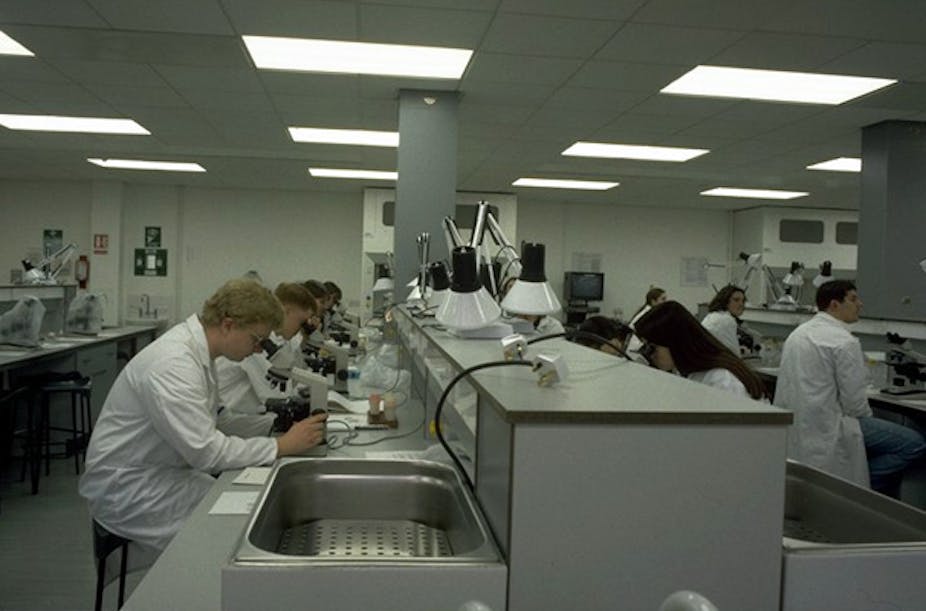Almost half a billion dollars will be cut over four years from a program that helps pay overhead costs for Australia’s researchers, according to a national mini-budget released on Monday.
The Federal Government’s Mid-Year Economic and Fiscal Outlook (MYEFO) for the 2012-13 financial year, released in Canberra on Monday, included cuts to the university sector that totalled around $1 billion, including the abolition of University Facilitation funding (saving $270m) and reductions to the Sustainable Research Excellence (SRE) ($499m) as well as savings in relation to student income support and scholarships ($250m).
The MYEFO said that “longer‑term growth in some research funding to universities will be temporarily slowed to ensure that research funding to universities remains sustainable.”
The MYEFO said the government would be “slowing the rate of funding increases for Sustainable Research Excellence by maintaining funding at the 2012 level for the 2013 calendar year, then increasing funding over the three years to a maximum amount of $300 million in 2016. This will decrease payments by $79 million in 2012‑13 ($499 million over four years). Funding will then be indexed annually from 2017 by the Higher Education Indexation Factor.”
The Sustainable Research Excellence program helps pay for costs associated with doing research, such as water, electricity, property costs and other infrastructure.
Treasurer Wayne Swan said in a statement that “the decisions taken in this MYEFO were difficult but critical at a time of falling revenues and ongoing global headwinds.” He said that the budget surplus would be around $1.1 billion (down from an original forecast of $1.5 billion).
The Chair of the Group of Eight universities and Vice-Chancellor of the University of New South Wales, Professor Fred Hilmer, said the cuts will lead to job losses.
“Clearly, we are bitterly disappointed that the brunt of the savings are going to come from research,” he said.
“This is the area that has had tremendous improvement in the last few years and is absolutely critical for the standing of our universities both as destinations for international students and peers for other great institutions in the world with whom we seek to do research.”
In a statement released by the Group of Eight, Prof. Hilmer said the cuts would “involve a loss of some 1,450 job opportunities.”
“Given that universities had already included the SRE funding in the budgets, the cuts can be expected to result in research staff being laid off,” he said.
Professor Daine Alcorn, Deputy Vice-Chancellor Research and Innovation at RMIT, said the cuts were “devastating”.
“This is what provides support for the overheads – the electricity, the water, the space you live on – for all of these programs. Cutting $499 million over the next four years is really taking back a promise the government gave to actually fund this kind of research in an appropriate way. It will have a devastating effect.”
The University of Melbourne’s Deputy Vice-Chancellor (Research), Professor Jim McCluskey, said cuts to the SRE program also threatened administrative staff, ethics panels, imaging facilities and specialist libraries.
“So our capacity to continue to rank as well as we have on the global ranking systems is pretty seriously impacted,” he said.
“It’s a long game. It’s like turning the Queen Mary and what happens now will impact in about three to five years. We will start slipping in the rankings, we can expect to struggle to provide our researchers with the level of support they require and we will start losing them.”
University of Technology Sydney Vice-Chancellor, Professor Ross Milbourne, said universities, researchers and students are shouldering a substantial part of the national budget savings measures.
“We are pleased to see that the Government has kept its commitment to indexation which is fundamental to ensuring a strong and sustainable university sector,” he said.
“However we are very concerned about the large cut to research infrastructure funding. Investing in research is a long-term process with far reaching benefits to society. Funds from the SRE have already been committed by universities - so this cut means equipment will be turned off and Australia risks losing high quality researchers to universities overseas.”
Tertiary Education Minister Chris Evans told Senate Estimates hearings this month that was a “ridiculous proposition” to suggest cuts would send bright researchers overseas.
University of Queensland Vice-Chancellor, Professor Peter Høj, also said he was grateful that the government would continue to index university funding to inflation but that Australia should have used the benefits of the resources boom to boost investment in innovation.
“It’s disappointing but it’s important for universities to understand that we live in a broader economy. If you have been in a hospital waiting room lately, you will know there are many other places that are crying out for extra funding,” he said.
ARC pause lifted but cuts elsewhere
The current round of Australian Research Council linkage grants had been closed due to a government-imposed funding freeze but opened on Monday.
The Australian Academy of Science said in a statement it welcomed the Government’s commitment to maintain funding for science research through the Australian Research Council and Cooperative Research Centres.
“This is an investment in Australia’s long term prosperity and security,” said Academy President Professor Suzanne Cory.
Separately, the government announced $652 million in National Health and Medical Research Council grants on Friday.

